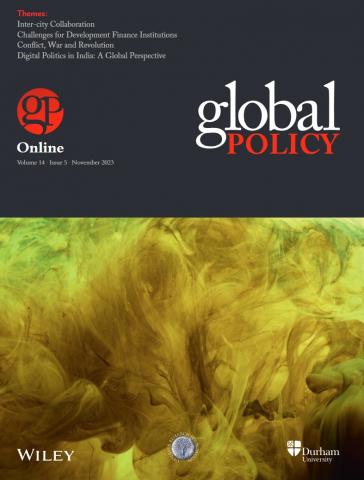The November 2023 issue of Global Policy includes two special sections: one on ‘Conflict, War and Revolution’ edited by Bettina Koch and Eva-Maria Nag; and a second on ‘Digital Politics in India: A Global Perspective’ edited by Jean-Thomas Martelli, Aasim Khan and Ralph Schroeder. There are also Policy Insight articles on, among others, the World Economic Forum, disinformation, civic ecosystems and science diplomacy. There is a practitioner’s commentary on the OECD’s arrangement on export credits.
Research Articles
Fifty years of peril: A comprehensive comparison of the impact of terrorism and disasters linked to natural hazards (1970–2019) - Timothy Wilson and Ilan Noy
Inter-city collaboration: Why and how cities work, learn and advocate together - Katharine A. Robb, Michelle LaPointe, Kathryn Hemsing, Grant Anderson, James Anderson and Jorrit de Jong
Sweden's image in the world: Still a ‘model’? - Ralph Schroeder
Fair and inclusive markets: Why dynamism matters - Reda Cherif, Fuad Hasanov and Philippe Aghion
Labour provisions in trade agreements and women's rights in the global south - Ida Bastiaens, Evgeny Postnikov and Anne-Kathrin Kreft
Net zero portfolio targets for development finance institutions: Challenges and solutions - Sam Fankhauser, Sugandha Srivastav, Ingrid Sundvor, Stephanie Hirmer and Gireesh Shrimali
Rhetorical coercion, institutional legitimacy and the creation of the Asian Infrastructure Investment Bank - Hai Yang
SPECIAL SECTION I - Conflict, War and Revolution - Edited by Bettina Koch and Eva-Maria Nag
Debating conflict, war and revolution: Introduction to the special section - Bettina Koch and Eva-Maria Nag
War in World Society: Towards a new order of global constitutionalism? - Hauke Brunkhorst
Give peace a chance … for what? Paine, Kant and democratic peace - Garion Frankel and Cary J. Nederman
Pacification as a key problem of politics in international political thought - Desirée Poets
Technology as a paradigm to investigate war - Xi Lin
Why conflict, war and revolution? - Paul Kelly
Policy Insights
The World Economic Forum: An unaccountable force in global health governance? - Desmond McNeill
Health systems appraisal of the response to antimicrobial resistance in low- and middle-income countries in relation to COVID-19: Application of the WHO building blocks - Jay Patel, Genevie Fernandes, Ambele Judith Mwamelo and Devi Sridhar
Civic ecosystems and social innovation: From collaboration to complementarity - Iavor Rangelov and Marika Theros
Lessons from outperformance in the Indian financial sector - Ashima Goyal
China's 5G and supercomputing industrial policies: A critical (comparative) analysis - Yuhan Zhang
Techno-nationalism or building a global science and technology commons? (but what about China?) - Leonard Lynn and Hal Salzman
New architectures for bottom-up science diplomacy: Learning from the evolving Portuguese diaspora in the UK - Luís Miguel Lacerda, Manuel Heitor and Jean-Christophe Mauduit
Hybrid warfare and disinformation: A Ukraine war perspective - Sascha-Dominik Dov Bachmann, Dries Putter and Guy Duczynski
Inequalities and content moderation - Giovanni De Gregorio and Nicole Stremlau
SPECIAL SECTION II - Digital Politics in India: A Global Perspective - Edited by Jean-Thomas Martelli, Aasim Khan and Ralph Schroeder
The sound, the fury and the silences: The politics of influence in digitalizing India - Jean-Thomas Martelli, Aasim Khan and Ralph Schroeder
Decoding the star system: Twitter and its impact on journalism in the global South - Aasim Khan, Midhat Fatimah, Kabir Dureja and Vedant Jumle
Populism à la Carte: The paradoxical political communication of Narendra Modi on Twitter - Jean-Thomas Martelli and Vihang Jumle
Influencers as institutions: Impact of digital politics in the Global South - Karishma Sinha, Paarmita Jhalani, Aasim Khan and Payel Chattopadhyay Mukherjee
Sporting the government: Sportspersons' engagement with causes in India and the USA on twitter - Dibyendu Mishra, Ronojoy Sen and Joyojeet Pal
Institutional isomorphism in corporate Twitter discourse on citizenship and immigration in India and the United States - Shehla Rashid Shora, Arshia Arya and Joyojeet Pal
The Aadhaar battle: Why some players in the corporate world needed a biometric ID? - Nicolas Belorgey
Practitioner Commentary
The new OECD arrangement on export credits: Breakthrough or bad compromise? - Andreas Klasen and Jan Vassard
